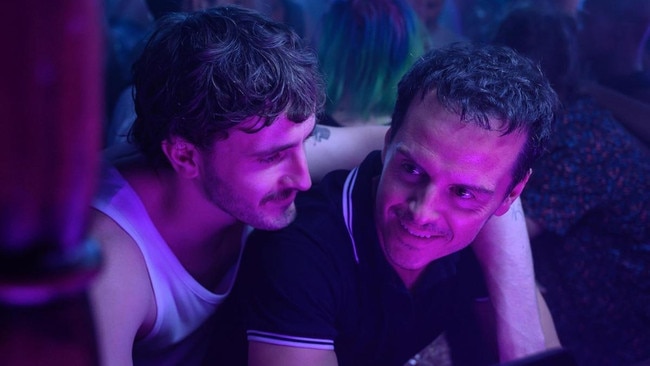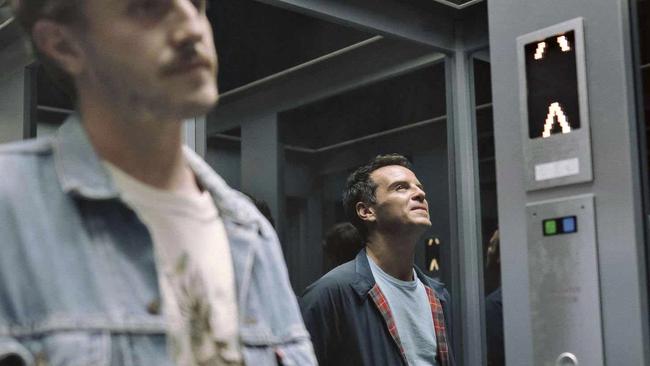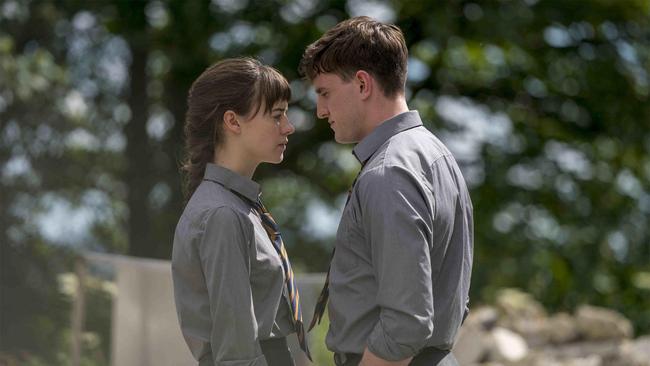Paul Mescal on why sex matters, and his journey to hunkhood
The star of the lockdown hit Normal People talks about screen sex, dating, the crisis of masculinity and his new film All of Us Strangers.

Four years ago Paul Mescal played the brooding Connell in Normal People – the boyfriend to Daisy Edgar-Jones’s Marianne in the BBC lockdown smash about seminars and shagging. Along with QR codes, the Irish actor became the breakout star of the pandemic, and legions of lovestruck fans waited to see which role his blue eyes would twinkle through next.
He did not disappoint. Soon he played the depressed young single dad Calum in the excellent British indie film Aftersun, which scored him an Oscar nomination. Then, last year, he took to the stage in London as Stanley Kowalski in A Streetcar Named Desire. Calum and Stanley are two truly difficult, damaged men. “Hopefully,” Mescal says with a smile, “people now actually say, ‘He’s not here to just be the token Irish hunk’.
“If you want a progressive male, sad character, I’m your guy!” he jokes, admitting the question he’s asked most frequently by journalists is: “Are you OK? You are always so sad in things …”
Mescal likes it this way, though. He wants his roles to start a conversation, about men and masculinity. He wants us to ask if men are OK.
Now, the actor goes even further. He plays the confident but complex Harry in All of Us Strangers. Andrew Haigh’s film is a triumph – a tear-jerker in which Adam (Andrew Scott) visits his parents (Claire Foy and Jamie Bell), who are still the same age they were when they died decades ago. Harry becomes Adam’s lover but then his secrets tumble out. Frankly, Harry needs help.
“We are still navigating, as men, how to be vulnerable,” Mescal explains, picking up on what drew him to Harry. He is thoughtful – heavy is the head that wears the frown. Yet he has a casual intensity and a soft, Irish warmth. Nestled in a busy bar in London, he rocks back and forth in a tight white T-shirt, earrings dangling.
“Time and time again,” he continues, “men are told vulnerability is weakness and not what society requires of them, so it’s difficult to reach out for help.”
I ask about Andrew Tate, who has millions lapping up his misogynist diatribes. “Jesus,” Mescal says, shaking his head. “It’s so dangerous. There is a version of masculinity that is toxic and ruined the world for the longest time and will continue to do so unless it’s put in check. Changing what it means to be a man isn’t an easy thing – there’s a lot of painful conversations to be had.”
And that conversation is why he makes the films he does. The man is an open book and, unlike most young actors (he is 27), one actually worth reading. Little is off topic.
As far as any of us know, Mescal is straight. But in All of Us Strangers Mescal’s Harry is gay, and some find it disrespectful these days when a straight actor takes on a gay role. Mescal, though, gives this short shrift.

“It depends who’s in charge of telling the story,” he argues. “The issue is that there have been so many queer performances in cinema that have been offensive, but that’s because the filmmakers and the actors have been careless. I don’t think this film exists in that conversation whatsoever. And that’s it.”
Mescal was born in Maynooth, outside Dublin, in 1996. His mother, Dearbhla, is a retired garda; his father, also called Paul, is a teacher. He has a younger brother and sister. As a teenager, Mescal was a sports jock who excelled at Gaelic football. He could have been a contender, but then acting called and soon he started to be likened to a young Marlon Brando. They share a certain mumbling magnetism, and by the time Mescal was studying acting at Trinity College Dublin he had long swapped goals for roles.
Still, he missed football. “There are times when acting can get catty, which I hate,” he says. Surely there is also cattiness in sport? “No. Your team is your team. But at drama school they’ll stab you in the back to get parts. It’s brutal. This really is the best job in the world. I just hope people don’t get bored of me doing sad movies.”
Nowadays, he is relaxed. “There will be roles Josh O’Connor will be better at than me. Or Austin Butler or Timothee Chalamet.” It probably helps that Mescal’s career seems to be in constant take-off … “Totally. I’ve had a good run.”
I spot a chain around his neck like the one Connell wore in Normal People. “It’s not the chain,” he says, laughing. “Daisy has that one.” He remains proud of the show, not least for the way sex was portrayed. Recent research suggested Gen Zers have been put off watching sex on TV – “It’s probably tied to the impact porn is having” – but Normal People offered loving sex in a safe environment.

“It’s massively important,” he explains of sex on screen. “If we remove it, to make younger people comfortable, we’d be doing everybody a disservice. Sex is a huge part of life, a form of communication.” When reading scripts Mescal imagines what a character’s sex life would be like, even if it is not actually stated in the script.
Normal People changed Mescal’s life. He moved to London just as the show took off and Covid took hold. “I was very alone,” he recalls. And now? “I live by myself and I love it.” He had a strange sort of fame to start with – a household name in a country where nobody could leave the house. I ask how things changed after lockdown.
Are most of his encounters with ordinary people positive? “Absolutely,” he says, although he suggests it isn’t all plain sailing. “If someone wants to be a dick and say that they went on a date with me, it doesn’t reflect poorly on me – it reflects poorly on them.”
Gladiator 2 is looming in November. Mescal plays the lead in Ridley Scott’s sequel to the Roman epic starring Russell Crowe, a film on a totally different scale to anything that Mescal has done. It is the most eagerly awaited blockbuster of the year. Until Gladiator Crowe enjoyed the same mid-level fame as Mescal does now, but suddenly became one of the most famous men on the planet. Is the new lead prepared for that?
“I don’t know what the difference will be,” he says, a little cautiously. “Maybe that’s naive? Is it just that more people will stop you in the street? I’d get profoundly depressed if that’s so and hope it isn’t true. I’ll have an answer next year, but if (the film) impacts my life in that way, I’ll be in a bad spot. I’d have to move on and do an obtuse play nobody wants to see.”
Mescal would enjoy that. Despite his celebrity status, he remains very much An Actor. He’s one who talks passionately about his “craft” while bemoaning the way Hollywood is hellbent on focusing on anything other than talent.
“Over the last few years people have been talking about films and TV shows as content,” he froths. “That’s a filthy word. It’s not ‘content’, it’s f--king work. I’m not being snobby, but there are two concurrent industries. One that works with a lack of care and artistic integrity. Go nuts, make stuff with Instagram followers as a factor, whatever … But the other is what’s always been there, the craft of filmmaking, directing, lighting and production design. That keeps artists alive. And audiences want to be challenged.”
Mescal certainly does. He has signed up to Richard Linklater’s latest opus, Merrily We Roll Along, which the Boyhood director is shooting intermittently over years (Boyhood told the story of a family, shot with the same cast over 11 years). Mescal will be 45 when they finish. “It’s even longer and a musical. At least I’ll be employed for the next 20 years.”




To join the conversation, please log in. Don't have an account? Register
Join the conversation, you are commenting as Logout